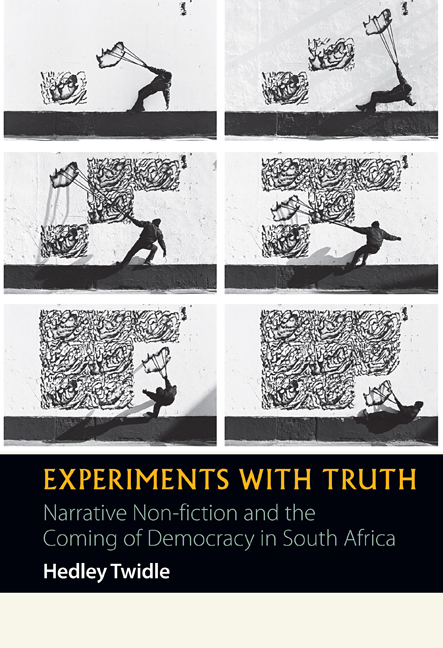Book contents
- Frontmatter
- Contents
- Preface: Encountering non-fiction
- 1 Introduction: Historical and theoretical approaches
- 2 Unusable pasts: The secret history of Demetrios Tsafendas: assassin, madman, messenger
- 3 Literatures of betrayal: Confession, collaboration and collapse in post-TRC narrative
- 4 In search of lost archives: Nostalgia, heterodoxy and the work of memory
- 5 A very strange relationship: Ambition, seduction and scandal in post-apartheid life writing
- 6 Some claim to intimacy: Political biography and the limits of the liberal imagination
- 7 In short, there are problems: Literary journalism in the postcolony
- 8 Unknowable communities: Necessary fictions and broken contracts in the heart of the country
- 9 A new more honest code: Memoirs of the ‘born frees’ and the futures of non-fiction
- 10 Afterword: The extracurriculum
- Bibliography
- Index
- Miscellaneous Endmatter
4 - In search of lost archives: Nostalgia, heterodoxy and the work of memory
Published online by Cambridge University Press: 11 September 2020
- Frontmatter
- Contents
- Preface: Encountering non-fiction
- 1 Introduction: Historical and theoretical approaches
- 2 Unusable pasts: The secret history of Demetrios Tsafendas: assassin, madman, messenger
- 3 Literatures of betrayal: Confession, collaboration and collapse in post-TRC narrative
- 4 In search of lost archives: Nostalgia, heterodoxy and the work of memory
- 5 A very strange relationship: Ambition, seduction and scandal in post-apartheid life writing
- 6 Some claim to intimacy: Political biography and the limits of the liberal imagination
- 7 In short, there are problems: Literary journalism in the postcolony
- 8 Unknowable communities: Necessary fictions and broken contracts in the heart of the country
- 9 A new more honest code: Memoirs of the ‘born frees’ and the futures of non-fiction
- 10 Afterword: The extracurriculum
- Bibliography
- Index
- Miscellaneous Endmatter
Summary
To the Chinese, it was the year of the Ox; to the Soviets, the year they said nyet to the broadcast of the imperialist Sesame Street on Soviet television; to the Germans, the year both East and West were admitted to the United Nations; to the Israelis, the year they won the Yom Kippur War; to the Brits, the year car owners scrambled to fill up as the government introduced fuel rationing; to the Americans, the year the Supreme Court legalised abortion with its decision in Roe v. Wade; and to Evelinah Papayi Dlamini, a 45-year-old working-class woman from Katlehong, a black township about 30 kilometres east of Johannesburg, the year her only surviving child was born. I was born on a Monday in Natalspruit Hospital, a 900-bed edifice since condemned to demolition for lying on dolomitic ground, on 29 January 1973. (25)
So begins chapter one of Jacob Dlamini's first book, Native Nostalgia (2009), an attempt ‘to understand the question of what it means for a black South African to remember his life under apartheid with fondness’ (2). The passage suggests the intersection of the personal and the political, or even the geopolitical, which characterises his writing: it is an oeuvre that often seems more interested in the relation between the local and the global than in remaining within an increasingly vexed and limiting national imaginary – a comparative ambition that I will be tracing throughout this chapter. The paragraph also suggests the playful, insouciant tone that Dlamini brings to this portrait of his upbringing in Katlehong, even as he navigates the pitfalls of such unstable terrain.
This autobiographical, personable beginning, however, is not allowed to stand for itself. It is pre-empted by an introduction in a far more analytic and often anxious register, one that turns to social and political theory to gird itself and to justify the intimate and vulnerable memory work that follows. Native Nostalgia is in this sense a book formed from a double helix of personal narrative and generalised analysis: a mixture of implicit and explicit ways of telling that make it an unusual and shape-shifting piece of writing.
- Type
- Chapter
- Information
- Experiments with TruthNarrative Non-fiction and the Coming of Democracy in South Africa, pp. 71 - 96Publisher: Boydell & BrewerPrint publication year: 2019

